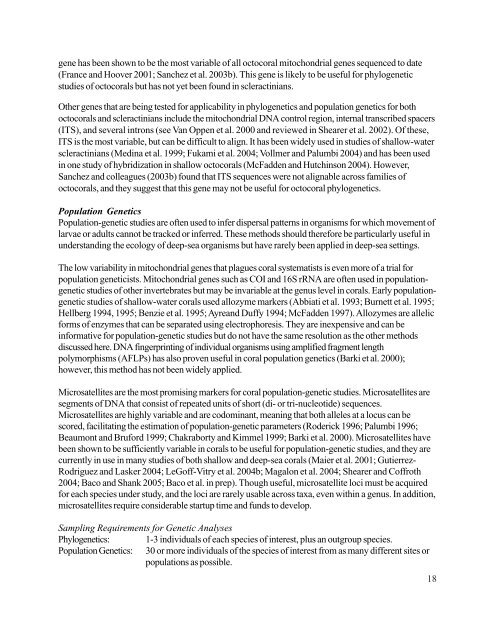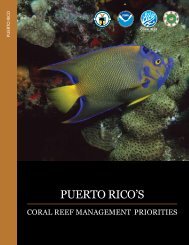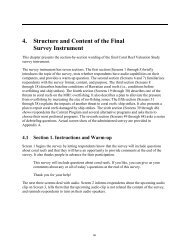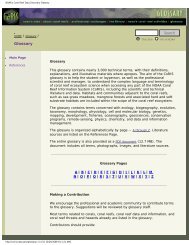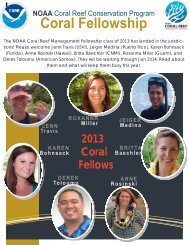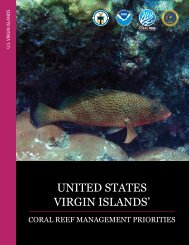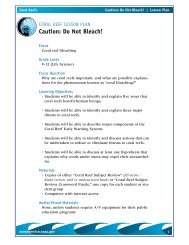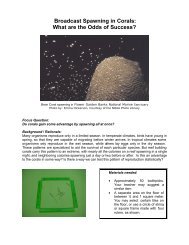Deep-Sea Coral Collection Protocols - NOAA's Coral Reef ...
Deep-Sea Coral Collection Protocols - NOAA's Coral Reef ...
Deep-Sea Coral Collection Protocols - NOAA's Coral Reef ...
- No tags were found...
You also want an ePaper? Increase the reach of your titles
YUMPU automatically turns print PDFs into web optimized ePapers that Google loves.
gene has been shown to be the most variable of all octocoral mitochondrial genes sequenced to date(France and Hoover 2001; Sanchez et al. 2003b). This gene is likely to be useful for phylogeneticstudies of octocorals but has not yet been found in scleractinians.Other genes that are being tested for applicability in phylogenetics and population genetics for bothoctocorals and scleractinians include the mitochondrial DNA control region, internal transcribed spacers(ITS), and several introns (see Van Oppen et al. 2000 and reviewed in Shearer et al. 2002). Of these,ITS is the most variable, but can be difficult to align. It has been widely used in studies of shallow-waterscleractinians (Medina et al. 1999; Fukami et al. 2004; Vollmer and Palumbi 2004) and has been usedin one study of hybridization in shallow octocorals (McFadden and Hutchinson 2004). However,Sanchez and colleagues (2003b) found that ITS sequences were not alignable across families ofoctocorals, and they suggest that this gene may not be useful for octocoral phylogenetics.Population GeneticsPopulation-genetic studies are often used to infer dispersal patterns in organisms for which movement oflarvae or adults cannot be tracked or inferred. These methods should therefore be particularly useful inunderstanding the ecology of deep-sea organisms but have rarely been applied in deep-sea settings.The low variability in mitochondrial genes that plagues coral systematists is even more of a trial forpopulation geneticists. Mitochondrial genes such as COI and 16S rRNA are often used in populationgeneticstudies of other invertebrates but may be invariable at the genus level in corals. Early populationgeneticstudies of shallow-water corals used allozyme markers (Abbiati et al. 1993; Burnett et al. 1995;Hellberg 1994, 1995; Benzie et al. 1995; Ayreand Duffy 1994; McFadden 1997). Allozymes are allelicforms of enzymes that can be separated using electrophoresis. They are inexpensive and can beinformative for population-genetic studies but do not have the same resolution as the other methodsdiscussed here. DNA fingerprinting of individual organisms using amplified fragment lengthpolymorphisms (AFLPs) has also proven useful in coral population genetics (Barki et al. 2000);however, this method has not been widely applied.Microsatellites are the most promising markers for coral population-genetic studies. Microsatellites aresegments of DNA that consist of repeated units of short (di- or tri-nucleotide) sequences.Microsatellites are highly variable and are codominant, meaning that both alleles at a locus can bescored, facilitating the estimation of population-genetic parameters (Roderick 1996; Palumbi 1996;Beaumont and Bruford 1999; Chakraborty and Kimmel 1999; Barki et al. 2000). Microsatellites havebeen shown to be sufficiently variable in corals to be useful for population-genetic studies, and they arecurrently in use in many studies of both shallow and deep-sea corals (Maier et al. 2001; Gutierrez-Rodriguez and Lasker 2004; LeGoff-Vitry et al. 2004b; Magalon et al. 2004; Shearer and Coffroth2004; Baco and Shank 2005; Baco et al. in prep). Though useful, microsatellite loci must be acquiredfor each species under study, and the loci are rarely usable across taxa, even within a genus. In addition,microsatellites require considerable startup time and funds to develop.Sampling Requirements for Genetic AnalysesPhylogenetics: 1-3 individuals of each species of interest, plus an outgroup species.Population Genetics: 30 or more individuals of the species of interest from as many different sites orpopulations as possible.18


